Papayas are a sweet tropical fruit native to Mexico and are now grown in many parts of the world including India, the Caribbean, and Florida. Papayas have a brightly colored orange flesh that is super tasty and used in a variety of desserts, smoothies, and salads around the world.
Is papaya healthy?
Papayas are loaded with nutrients and antioxidants with documented health benefits. For example, papayas are high in vitamin C, E, K and beta-carotene (1).
Here’s a quick look at the nutrition facts for 1/2 cup of raw papaya (2):
- Calories: 31.2
- Fat: 0.2 g
- Sodium: 5.8mg
- Carbohydrates: 8g
- Fiber: 1.25g
- Sugars: 5.5g
- Protein: 0.35g
- Vitamin A: 34.1mcg (promotes eye health!)
- Vitamin C: 44.15mcg (vital for our immune system!)
- Folate: 53.6 mcg
While papaya has plenty of healthy nutrients, like other tropical fruits, ripe papaya is very high in fructose (fruit sugar). Like all sweet foods, papayas should be consumed in moderation!
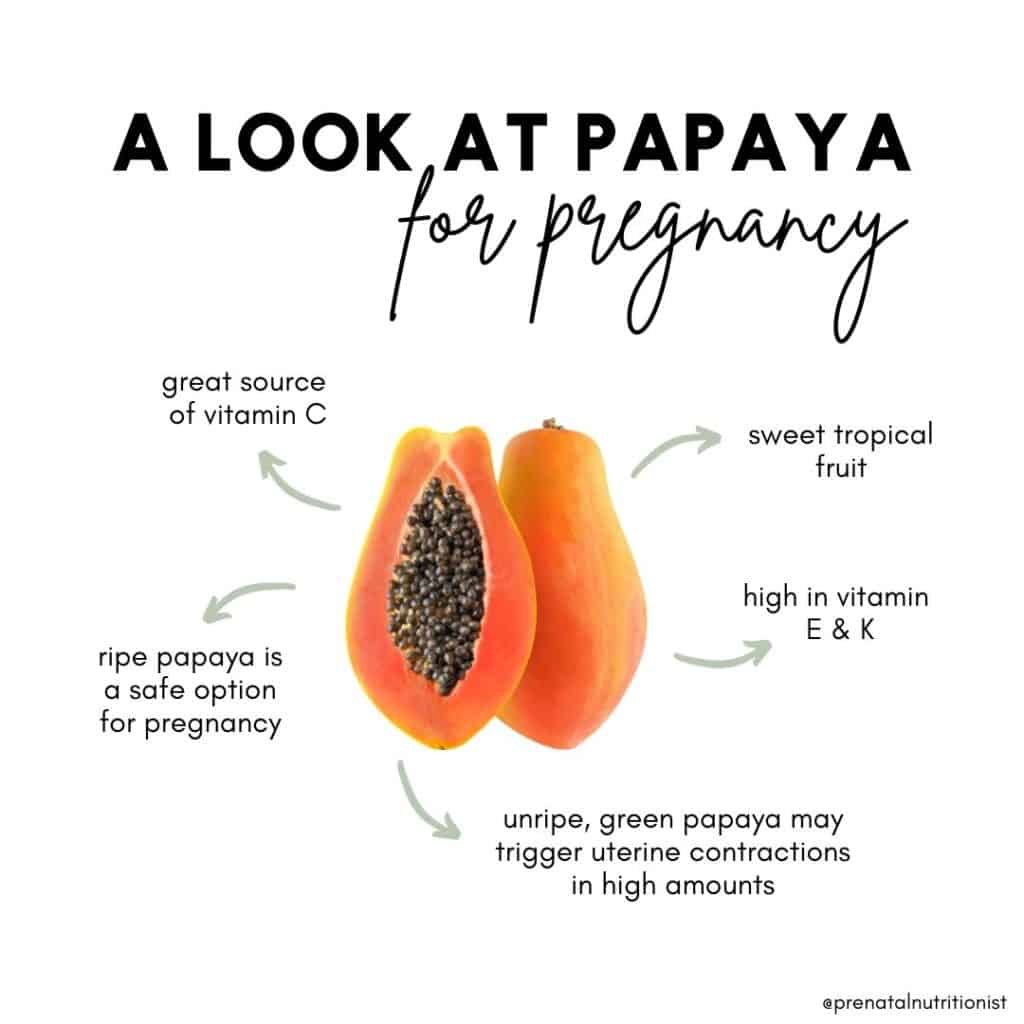
Is papaya safe for pregnancy?
Ripe papayas are fine to consume in small to medium size portions (think 1/2 cup serving size). However, a semi-ripe or unripe papaya contains a substance called latex, which has been reported in small studies and animal studies to trigger uterine contractions (3).
The papain content in the latex is also known to increase chances of embryotoxicity and weaken the vital membranes of the fetus (4). As such, unripe or semi-ripe papayas should be avoided during pregnancy although small amounts are probably safe (4).
Papayas will ripen more quickly when put in a paper bag with ethylene-producing fruits, such as apples or bananas. Stay away from green skinned (raw) papayas.
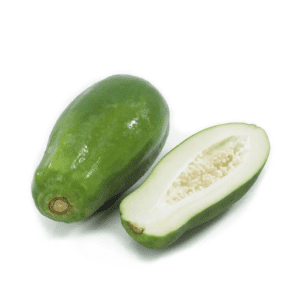
This is an unripe green papaya!
 Can I eat papaya if I have gestational diabetes?
Can I eat papaya if I have gestational diabetes?
Pregnancy is a naturally insulin resistance state meaning it’s easier for you to get high blood sugar levels compared to when you’re not pregnant. Monitoring blood sugar is especially critical if you’ve been diagnosed with gestational diabetes.
Unfortunately, papayas are pretty high in sugar (fructose) which means they will cause an increase in your blood sugar even though they come with plenty of awesome nutrients. For this reason, it is recommended to limit the consumption of papaya and other tropical fruits like bananas, mangoes, and pineapples.
One serving (~½ cup) of papaya equates to 8 grams of carbs which counts for half of a “carbohydrate exchange” or portion (5). Everyone’s carbohydrate needs are different and the amount of carbohydrate grams you should eat per day should be individually determined with your dietitian. For most people, 1-2 servings a day of fruit is still okay!
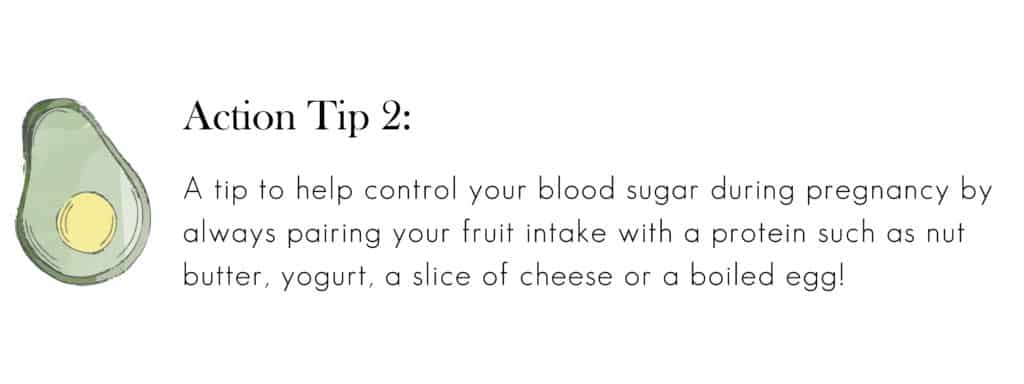 How does papaya impact gut health?
How does papaya impact gut health?
Papain, a proteolytic or digestive enzyme found in papayas, is potentially helpful for digestion and our gut health because of the way it helps break down food proteins (6). Some people find papaya eases indigestion and helps with constipation.
However, it is not recommended to take papain in supplemental form. If you have more questions about digestive enzymes read this note!
Are there other fruits that should be avoided during pregnancy?
For the most part, fruit is a safe and healthy option for pregnancy. In general, fruit is high in antioxidants, water, fiber, vitamin C, and more. You may have heard it referred to as “nature’s candy” due to its typical sweet taste that we love.
Pineapple and grapes are two other fruits you may have heard should be avoided during pregnancy – these are myths. Learn more about pineapple in this note, and grapes in this note. Lastly, dates are a popular topic when it comes to prenatal nutrition– learn all about dates here.
If you are struggling with blood sugar imbalances or have been diagnosed with gestational diabetes, fruits that are “low glycemic” meaning foods that lead to a smaller increases in blood sugar are your best bet. These are fruits typically found outside of the tropical fruit category. Think raspberries, blueberries, blackberries, apples, and pears. All of these fruits are lower in fructose and may be less likely to spike blood sugar and cause side effects associated with diabetes (7).
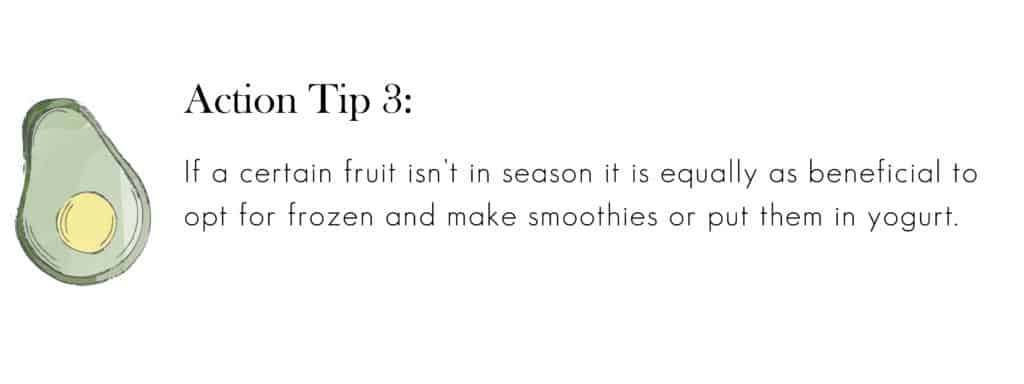 If you are craving papaya or are a big papaya fan try this smoothie below!
If you are craving papaya or are a big papaya fan try this smoothie below!
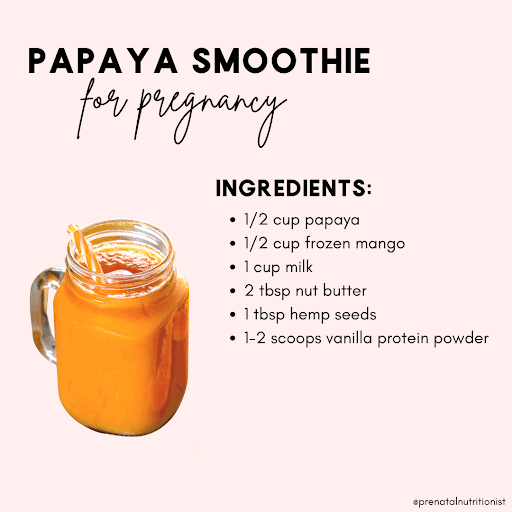
The Bottom Line
- Ripe papayas along with other fruit are fine to consume in typical portions during pregnancy.
- Note of caution – a semi-ripe or unripe papaya contains a substance called latex, which may trigger uterine contractions in high amounts.
- Papayas are high in sugar (fructose) and if you have been diagnosed with gestational diabetes, limit the daily intake of papaya and other tropical fruits like banana, mangoes, and pineapples to about a cup per day.
- If papayas are one of your favorite fruits, try blending it in a smoothie with some nut butter and protein, or eat it in some creamy yogurt.
Written by: Clare Viglione, MPH, RD and Ryann Kipping, MPH, RD


